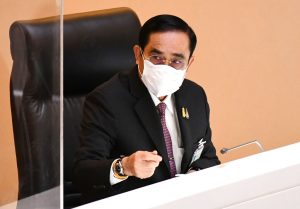Thai lawmakers yesterday began a no-confidence debate targeting Prime Minister Prayut Chan-o-cha and five members of his cabinet over their poor handling of the COVID-19 pandemic.
The debate is scheduled to last four days, with voting by the lower house set for Saturday. Meanwhile, the organizers of anti-government street protests say they will step up their own campaign of demonstrations demanding Prayut’s resignation and other far-reaching political reforms.
Sompong Amornvivat, leader of the opposition Pheu Thai party, opened the debate yesterday with a fiery attack on Prayut, describing the former general as “a power-crazed arrogant person unsuitable to lead the country,” according to the Associated Press.
“If we let him continue his leadership, it will lead to more people being infected and losing their lives,” said Sompong. “There won’t be enough crematoriums in service and there will be no way to stop the spread of the disease.”
In addition to Prayut, the opposition plans to grill government Public Health Minister Anutin Charnvirakul and Transport Minister Saksayam Chidchob, both of whom belong to the Bhumjai Thai Party; Labor Minister Suchat Chomklin and Digital Economy Minister Chaiwut Thanakamanusorn, from the ruling Palang Pracharath party; and the Democrat Party’s Agriculture Minister Chalermchai Sri-on.
After emerging from the first year of the pandemic relatively untouched by the virus, Thailand has been hit hard by the virus over the past five months. Of the 1.2 million infections that Thailand has recorded since the start of the pandemic, 1,175,866 have been recorded since April 1. The country has also tallied 11,589 deaths from the disease.
But even as Thailand’s outbreak is beginning to ease – the daily caseload dropped below 15,000 yesterday, the lowest total since July 27 – Prayut’s opponents are assailing the administration for what they claim is its bungled response to the belated outbreaks.
Critics claim that the government squandered the country’s head start against the virus, which was purchased at the cost of economically damaging shutdowns and travel restrictions. In particular, they accuse Prayut’s administration of failing to secure adequate and timely supplies of COVID-19 vaccines.
The government’s vaccine strategy rested heavily on a vaccine production deal between the pharmaceutical firm AstraZeneca and Siam Bioscience, a company with no previous experience in producing vaccines. When the prominent opposition politician Thanathorn Juangroongruangkit alleged favoritism – Siam Bioscience is owned by Thailand’s King Vajiralongkorn – he was charged under Thailand’s lese majeste law, which criminalizes any criticisms of the king or royal family.
In recent weeks, Thailand’s vaccination rollout has finally begun to gather momentum. As of August 30, the country had administered one dose of vaccine to just over a third of its population, placing it in fifth place in ASEAN, according to the Our World In Data tracker. But the 11 percent of the population that has been fully vaccinated remains the third-lowest in the region, and inoculation rates among the elderly and other vulnerable groups continue to lag behind other groups.
Prayut came to power in a military coup in 2014, and has since transitioned to the country’s civilian leader, thanks to some creative redistricting and a junta-drafted constitution that allows the military to appoint the entire upper house of parliament.
The deeply flawed election – and the court-ordered dissolution of the popular opposition Future Forward party on a technicality in early 2020 – helped spark the mass demonstrations that cascaded through the second half of last year, demanding Prayut’s resignation and reforms of the overweening power of the Thai monarchy.
While the no-confidence debate, like a similar effort earlier in the year, is unlikely to unseat Prayut, it offers opposition lawmakers an opportunity to exact a political cost from the government for its handling of the pandemic. Whether this will have an impact when Thailand next goes to the polls remains to be seen. But until then, the war of political attrition between the Prayut government and its burgeoning ranks of enemies is set to continue on.

































